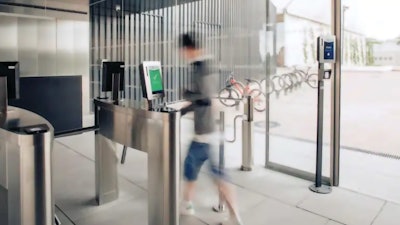
As the NFL season heats up, fans are eagerly searching for tickets and anticipating the thrill of catching the action live. This excitement, however, often tends to fizzle out thanks to long lines and exhaustive ticketing processes. Fans can end up tired and frustrated by the time the kick-off whistle blows.
This reality is not a necessity and with facial authentication technology, stadium entry can be hands-free while guaranteeing a safe and secure experience. With stadium attendance on the upswing, facial access could be the game-changer the NFL needs.
Lengthy delays ruin game day
The NFL is a spectacle, drawing nearly 70,000 fans per game on average. However, the entry experience often falls short of expectations. Traditional ticketing methods, whether paper or digital, have their drawbacks. Fans often find themselves stuck in long lines, especially at high-stakes games in large venues, turning what should be a thrilling day into a test of patience.
Add in issues such as lost tickets and malfunctioning QR scanners, and the patience exhaustion can be further exacerbated, particularly in a mid-January sleet.
Long waits can also result in a loss of revenue for the venue if fans can’t spend maximum time inside the stadium spending money on concessions or merchandise. Moreover, fan presence not only boosts team morale, but also increases the likelihood of winning, promoting the franchise and attracting better sponsors – all of which are crucial for revenue growth.
Both the fans and the venue deserve a more efficient and convenient access method. In an era in which technology is deeply integrated into our daily lives, it’s time for NFL stadiums — and sports venues of all kinds — to catch up and consider innovative new solutions for stadium access.
Picking up the pace
Facial authentication is a compelling solution to the stadium entry problem. The technology has become increasingly common, employed for tasks such as unlocking our phones or authorizing financial transactions. Its under-utilized benefits could potentially be more widespread, though, as the technology can be a powerful timesaver for managing crowded public spaces.
With facial access at the stadium entry, fans that have pre-enrolled from home can simply walk up to a facial recognition terminal and gain access in less than a second. No more fumbling with tickets or mobile apps — a quick scan and you’re part of the action.
The benefits extend beyond just speed. Biometric systems offer a level of security that traditional methods can’t match. They ensure that the person entering the venue is the genuine ticket-holder, effectively eliminating the risk of ticket forgery.
This technology is not just a theoretical concept but a practical solution successfully implemented in a wide array of stadiums. The Tennessee Titans became one of the latest teams to implement biometrics at their home stadium last month, joining the Atlanta Falcons, the Cleveland Browns and others. Additional sports sectors — from soccer to baseball — have also successfully piloted biometrics programs to address issues ranging from wait times to violence.
Privacy, regulatory concerns
While the advantages of facial authentication are evident, it’s crucial to address the elephant in the room: data privacy. There are some long-standing consumer concerns about the technology, especially in how data is stored and used. With the rising threat of data breaches, the idea of cybercriminal gangs stealing your likeness is a worrying scenario.
However, the form of facial recognition deployed in stadium management eliminates these concerns. When a fan enrolls, it is translated into a biometric vector. Later, when they enter the stadium, the system turns the live image of their face into another vector and compares the two. The actual image of the fan is not stored on the system, and the vector itself cannot be reversed or used across other biometric systems. This means there is no opportunity for criminals to misuse the system or breach the users’ privacy. It also puts it in line with increasingly stringent data protection measures such as the California Consumer Privacy Act (CCPA) and the General Data Protection Regulation (GDPR) in the EU.
For facial access to be favored by users, it must be presented as an opt-in system so that fans who are uncomfortable with it can still choose traditional entry methods. This flexibility ensures that the technology is inclusive and respects individuals’ preferences and privacy choices. By addressing these concerns head on, NFL stadiums can build trust among fans, paving the way for broader adoption of this groundbreaking technology.
Taking FA tech to the house
By significantly reducing entry times, facial authentication allows fans to spend more time enjoying the game and contributing to the financial growth of the venue and less time waiting in line. Implementations have seen biometric access increase entry rates as much as five-fold, enabling an average of 50 fans a minute to enter each stadium gate.
Stadiums looking to kick off facial access should consider a phased approach. Starting with pilot programs allows for real-world testing and provides an opportunity to address any issues that may arise. The full implementation needs to be stress-tested to ensure it’s up to the job when fans are streaming in for a big game. This approach ensures the system’s effectiveness and builds credibility among fans, making them more likely to embrace the technology.
Once venues master the basic applications of biometrics technology, they can then start to introduce it for things such as facial payment, age verification for beverage purchases, remote credentialing for media members, and much more. Making these mundane tasks effortless will significantly improve the game-day experience and overall enjoyment of the event.
As the football season unfolds, the question isn’t whether biometric technology will play a role in stadium access, but how quickly it can be adopted to benefit fans and stakeholders alike. It’s time for the NFL to embrace this innovation for a smoother, safer and more enjoyable Sunday football experience.





































